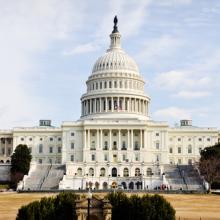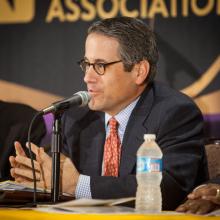Republicans
IN 2013, Sojourners commissioned a messaging study to contribute to the creation care movement—the Christian response to climate change. We polled nearly 1,100 people, oversampling for evangelical Christians, since evangelicals can be politically effective when activated on justice issues, as they have been on immigration, HIV/AIDS, and human trafficking.
Our goal was not only to learn evangelicals’ attitudes about climate change, but also to explore which messages are most compelling so we can better communicate on the issue and make an effective difference for God’s creation.
The first thing we learned was that many of the common stereotypes about evangelicals and climate change simply aren’t true. For one thing, the majority of evangelicals we surveyed (60 percent) agree that climate change is happening, and most say that human activity plays a role.
Second, one’s position on climate change is better predicted by political affiliation than by religion but, interestingly, evangelical Republicans are more likely to support action on climate change than non-evangelical Republicans. Young evangelicals are also more receptive to climate change messages than non-evangelical young people. And for those who don’t agree with us on climate change, there is a low level of certainty: Twenty-five percent of evangelicals are in the moveable middle, either “somewhat sure” that climate change isn’t happening or undecided. This means there’s a good chance that they already care, or that their opinion could be changed.
Sojo editors looked back at the blogs of 2013 and found that these were the 10 most widely read Sojourner blog articles of the past year.
I was talking to my wife, Amy, today about the news that Speaker John Boehner has requested movement from his party toward a temporary increase of the United States government debt ceiling.
The shutdown in itself is problematic enough. Our leaders have willfully put about a million people out of work while they haggle about policy that has already been put into law. The cost of their standoff to the United States economy is a loss of about $1.6 billion a week in economic output. And it’s more than a little bit ironic that this is being done on the watch of a Congress that supposedly has its first priority as jobs and economic growth.
However, all of this pales in comparison to the potential damage that would ripple throughout the global economy if we were to default on our debt. Because so many markets in the world peg their valuation system to the American dollar, and because so many exchanges use our currency as their monetary system, the prospect of the credibility of our money losing its footing in a potentially irreparable way could be nothing short of catastrophic worldwide.
“We should just fire them all," said Amy. “Just clean house and start fresh.”
The thing is, although this is a sentiment I hear on nearly a daily basis, and I've heard it over the course of many years, very little of substance seems to change when it comes to who represents us in Washington, D.C.
It’s time to end this shutdown. I’m standing in full view of the Capitol Building with a group of clergy and faith leaders who are here to offer a “Faithful Filibuster” of the government shutdown – and we’re going to keep talking until things change.
We know that this shutdown disproportionately affects the most vulnerable in our society. So our words will not be wasted diatribes or placements of blame. Rather, we will use God’s own words – reading the more than 2,000 Bible verses that speak to God’s justice for the poor and vulnerable – until this shutdown ends.
And while we recite the verses to bear witness for those suffering, we want to make sure that every single member of Congress can read them too. It is our goal to send each member a copy of the Poverty and Justice Bible, which highlights each of those 2,000 verses. Our elected officials need this reminder now more than ever.
Yesterday, before Republicans in the House of Representatives voted to push through a plan to slash nearly $40 billion from the food stamp program, Jim Wallis said we would keep an eye on which way of our elected officials voted.
"We will be watching who votes against feeding the hungry this week and will remember to bring that to public attention when they run for re-election. We will be doing our own faith count today. Stay tuned for the results."
Well here are the results. The plan passed narrowly, 217-210 — with all the yea votes coming from the Republican side. Fifteen Republicans joined with the Democrats against the plan.
So, who voted for that $40 billion cut to the food stamps program, which would kick an estimated 4 million hungry people out of the program next year? Here's your list. Is your Congress member on it?
If you know the facts and faces of the hungry families that are helped by SNAP, I believe it is a moral and even religious problem to vote to cut them. The Bible clearly says that governmental authority includes the protection of the poor in particular, and instructs political rulers to promote their well-being. So the argument that the poor should just be left to churches and private charity is an unbiblical argument. I would be happy to debate that with any of our conservative Congressmen who keep telling our churches that we are the only ones who should care for the poor. To vote against feeding hungry people is un-Christian, un-Jewish, and goes against any moral inclination, religious or
Finally, for politicians to defend these SNAP cuts because of our need to cut spending generally is un-credible and incredible.
These same politicians are not willing to go to where the real money is: the Pentagon budget, which everyone knows to be the most wasteful in government, or the myriad subsidies to corporations, including agribusiness subsides to members of Congress who will be voting to cut SNAP for the poor.
Tea Party-elected Rep. Stephen Fincher, (R-Tenn.), who likes to bolster his anti-poor rhetoric with misused Bible verses, collected $3.5 million in farm subsidies between 1999 and 2012, according to the New York Times. Fincher is helping to lead the effort to cut food stamps to working families with children by illogically quoting: “The one who is unwilling to work should not eat,” all the while collecting millions of dollars in agricultural subsidies. Congressman Fincher's position is hypocritical — and it's this kind of hypocrisy that makes Christians look bad and turns young people away from the church.
You see, for many House conservatives this isn't really about SNAP, but about their opposition to the idea that as a society we have the responsibility to care for each other, even during the hard times or when resources are few. Conservatives know their ideas for privatizing Social Security or cutting funding to Medicare and Medicaid are politically unpopular, but their ideology of individualism that borders on social Darwinism remains unchanged. SNAP is the perfect target for them. The image of what it does and whom it serves has been widely distorted by the media, while the people who benefit from it have little influence in the halls of Congress and pose little risk to the political careers of Republican members.
An effort to tweak President Obama’s health care reform bill to fill a gap for church health insurance plans could fail because of Republicans’ insistence on repealing the law.
Without a fix, United Methodist Church leaders say some of their churches could drop current coverage for employees once “Obamacare” takes full effect next year, according to Colette Nies, spokeswoman for the UMC’s General Board of Pension and Health Benefits.
Under Obama’s 2010 Affordable Care Act, more than 50 percent of UMC clergy would qualify for tax credits available to lower- and middle-class families to purchase insurance. But because of the way the law was written, those tax credits cannot be used toward insurance plans churches can offer through government-run exchanges.
“This is a day that the Lord has made.”
Those words begin a very popular worship song among evangelical Christians. And they were the first words that came to my mind when I stood alongside the widest spectrum of evangelical leaders we have ever seen at a gathering yesterday morning on the West Lawn of the U.S. Capitol. We were there to lead a day of prayer and discussion with the leaders of the House of Representatives about the urgent need for comprehensive immigration reform — more specifically to fix a system that is not only broken, but cruel for millions of people.
The whole day was sponsored and led by the Evangelical Immigration Table, one of the most hopeful signs in many years of how Christians can come together to make a difference. At the press conference, Christianity Today editor Andy Crouch, speaking as a journalist, said he has never seen such evangelical unity over any other issue
.
The number of those who’ve benefitted from the Supplemental Nutrition Assistance Program (SNAP) has increased nearly seven percent from 8.7 in 2007 to 15.2 in its most recent study. Despite the economic challenges America has faced over the past several years, the Houses’ decision to do away with food stamps has not only caused controversy between the House and the Senate but has caused controversy between the government and the American people. The New York Times reports:
Something terrible has happened to the soul of the Republican Party. We’ve gone beyond bad economic doctrine. We’ve even gone beyond selfishness and special interests. At this point we’re talking about a state of mind that takes positive glee in inflicting further suffering on the already miserable.
Read more here.
With only hours left until the Senate releases the final tally of those in favor of immigration reform, House Speaker John Boehner and others prepare as controversial issues are bound to arise at the July 10 “closed-door” conference. The Daily Beast reports:
The closed-door powwow promises to be an electrifying exercise in spleen venting, thrust upon them by their Senate brethren. At some point in the next day or two, the upper chamber is expected to pass its sprawling, blood-sweat-and-tears-drenched overhaul of our FUBAR immigration system. In the run-up to voting, Hill watchers have been aflutter over whether the bill can pull enough Republican support to hit 70 “yeas”—maybe even 71! A procedural test vote Monday topped out at a mildly disappointing 67 (including 15 Rs). But the last-minute horse-trading continues, and reform advocates remain optimistic that the final tally will be big and bipartisan enough to goose the House into passing something similarly sweeping.
Read more here.
The vast majority of evangelicals have voted with the GOP in recent elections. In fact, despite some qualms about his Mormon faith, 79 percent of evangelicals voted for Republican nominee Mitt Romney in 2012, the same percentage that voted for President George W. Bush in 2004.
So why would the party hire its former South Carolina chairman to lead engagement to a group that for a generation or more has been the reliable anchor of the party faithful? Here are four reasons.
While immigration and gun violence issues are capturing most of the week's headlines, the budget battles have re-emerged in Washington, D.C. Last month House Budget Chairman Paul Ryan (R-Wis.) and Senate Budget Chairwoman Patty Murray (D-Wash.) released competing budget proposals. And today, President Barack Obama released his own plan, which aims to reduce the deficit through a combination of spending cuts and revenue increases.
As The Washington Post's Ezra Klein and Evan Soltas note:
Today’s budget is the White House’s effort to reach the bedrock of the fiscal debate. Half of its purpose is showing what they’re willing to do. They want a budget compromise, and this budget proves it. There are now liberals protesting on the White House lawn. But the other half is revealing what the GOP is — or, more to the point, isn’t — willing to do. Republicans don’t want a budget compromise, and this budget is likely to prove that, too.
As the White House sees it, there are two possible outcomes to this budget. One is that it actually leads to a grand bargain, either now or in a couple of months. Another is that it proves to the press and the public that Republican intransigence is what’s standing in the way of a grand bargain.
“We firmly oppose organized efforts, such as those regrettably now seen in this country, to break existing unions and prevent workers for organizing.”
My brother bishops and I wrote that more than a quarter-century ago in our 1986 letter Economic Justice for All. Regrettably, it rings true still today.
The right-to-work legislation that was passed by the House and the Senate in Michigan just this month is designed to break unions. It is designed to prevent workers from organizing. And we must oppose it as firmly as we did during the 1980s.
There is some good stuff on the God’s Politics blog this week encouraging Christians to drop their concern about the “war on Christmas.” It’s a good idea. However, as we’re getting over our huff about “Happy Holidays,” we’d like to shift your attention to the real war on Christmas: the priorities of Washington politicians that are fundamentally at odds with the hope, love, joy, and peace celebrated by Christians during the Advent season.
As political leaders engage in negotiations to avoid the so-called “fiscal cliff,” we need them to preserve programs that reduce poverty and keep our families healthy. Unfortunately, House Speaker John Boehner and others in Congress are pushing to cut programs for the poor and vulnerable, while protecting tax breaks for the wealthiest Americans.
Soon after George W. Bush won his first presidential election, Washington lobbyist, Grover Norquist, helped craft the tax cut legislation that would go down in history as “the Bush-era tax cuts.” Among other things, the legislation dropped top marginal tax rates from 39.6 percent to 35 percent and was written to expire on Dec. 31, 2010.
In 2010, Democrats tried to put forward two separate packages of legislation that would extend the cuts, first for earnings up to $250,000, then for earnings up to $1 million. The Democratic-led House passed both bills, but Republican filibuster blocked both in the Senate. President Barack Obama resolved the stalemate by extending all the Bush tax cuts for two more years.
Here’s the irony: Republicans claim to hate deficits, but the facts are clear. If extended indefinitely, the Bush-era tax cuts will account for nearly half of America’s budget deficit by the year 2019.
The day after the election, Southern Baptist Seminary President Albert Mohler said, “I think this was an evangelical disaster.”
Not really. But it was a disaster for the religious right, which had again tied its faith to the partisan political agenda of the Republican Party — which did lose the election. But Nov. 6 was an even deeper disaster for the religious right’s leaders, because they will no longer be able to control or easily co-opt the meaning of the term “evangelical.”
During this election, much of the media continued to use the word as a political term — as a key constituency of the Republican conservative base. But what the media really means when they use term “evangelical” is “conservative white evangelical.” All other kinds of evangelicals are just never counted.
Just as the 2012 electoral results finally revealed the demographic transformation of America — which has been occurring for quite some time — it also dramatically demonstrated how the meaning of the word “evangelical” is being transformed.
Evangelical can no longer be accurately used to mean “white evangelical.”
When I stepped back and really thought about what I was experiencing on election night, I started thinking about the night of April 4, 1968, just hours after Martin Luther King, Jr. was assassinated. Having not yet been born, I thought about the coverage of it that I’ve seen. About how Robert Kennedy found himself in front of a crowd of supporters for a presidential campaign rally in Indianapolis. Many there that night were black and hadn’t heard the news of King’s death. As he did with most difficult topics, Kennedy laid it all out there. The crowd gasped and screamed and cried. Kennedy said he understood the anger and hate each of the men and women there that night would probably feel. After all, a white man had also killed his brother.
“What we need in the United States is not division,” Kennedy told the crowd. “What we need in the United States is not hatred. What we need in the United States is not violence and lawlessness, but is love and wisdom and compassion toward one another. A feeling of justice toward those who still suffer within our country.”
During the 2004 presidential election season, Sojourners put out a bumper sticker with these words: “God Is Not a Republican, or a Democrat.” The number of orders was overwhelming and we kept running out. The simple message struck a chord among many Christians who were tired of the assumptions and claims by the Religious Right that God was indeed a Republican, or at least voted a straight-party ticket for the GOP. They also absurdly implied — and sometimes explicitly stated — that faithful Christians couldn’t support Democratic candidates. We said that voting was always an imperfect choice in a fallen world, based on prudential judgments about how to best vote our values, that people of faith would always vote in different ways — and that was a good thing for a democracy and the common good.
Our efforts appeared to inject some common sense into our nation’s political discourse, but given recent electoral statements and newspaper ads from some conservative Christian leaders, it appears the message bears repeating — God is still not a Republican or Democrat.
BETHESDA, Md. — With voters focused intently on pocketbook issues, both Mitt Romney and President Barack Obama are framing their faith-outreach efforts around the economy as the presidential campaign enters its final weeks.
That marks a shift from previous election cycles, campaign advisers say.
“That’s a major difference between this election and the last. The economy is the single issue that transcends every demographic, every coalition, every interest group,” said Mark DeMoss, an evangelical who has led Romney’s efforts to rally conservative Christians — a key Republican voting bloc — around the GOP nominee, who is a Mormon.
“Evangelicals are no less interested in the unemployment rate and the cost of living than non-evangelicals,” DeMoss added.
I’m a fan of TIME Magazine. It offers concise, intelligent summaries and opinions on the news that help keep me up with current events. They had an interesting article in the last few weeks about the factors that seem to affect a political party’s election results in the upcoming cycle. From their findings, it’s the party perceived to be most optimistic about the nation’s future that tends to come out on top. A fascinating bit of psychology, if not necessarily scientifically rigorous in its conclusions.
And then, in the most recent issue, there’s a pages-long piece by Bill Clinton called “The Case for Optimism,” which outlined five reasons to look ahead with hope toward our collective future. Coincidence? Maybe. But the timing of the two pieces, particularly only weeks out from a presidential election, seems more than a little bit opportunistic.
Call me cynical, but never let it be said that I’m above holding the Democrats’ feet to the fire when they pander. Yes, both parties do it, but it seems to me it’s most effective when it’s a little less in-your-face about it. President Obama rode a tide of optimism into the White House four years ago, only to watch his support erode after the reality didn’t live up to the speeches in many cases. But we wanted to hear it, and it worked. So it’s no surprise they’re giving it another go-round.
But are there grounds for such high hopes?















